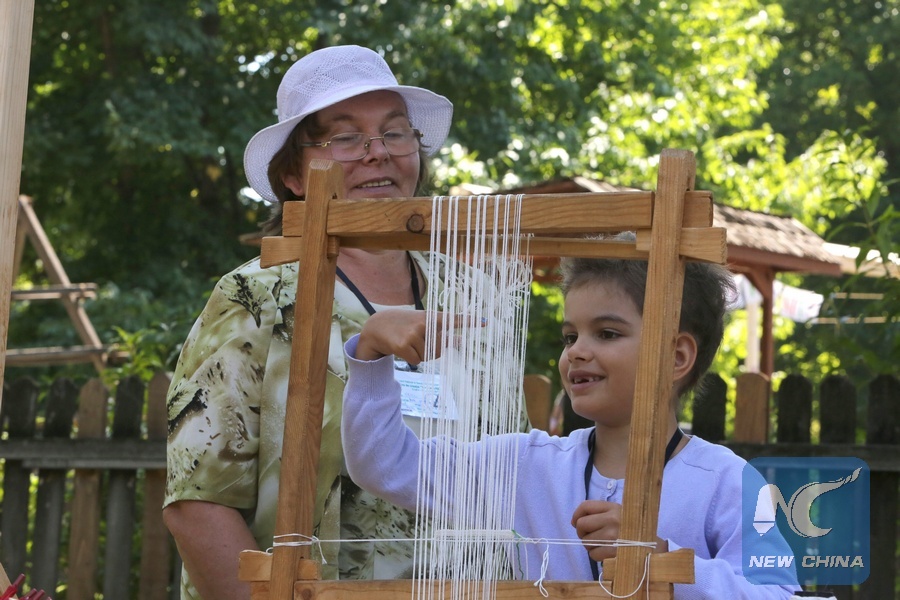
A girl works at a vertical loom during the summer workshops at National Village Museum, where kids can learn different traditional handcrafts, in Bucharest,Romania, July 26, 2017. (Xinhua/Gabriel Petrescu)
By Marcela Ganea
BUCHAREST, July 28 (Xinhua) -- "Summer along the lanes" in the Village Museum in Bucharest may be one of the most comprehensive projects for children in the summer holiday across Europe.
It subtly prepares children of all ages to appreciate and respect the cultural treasures, and to understand differences and similarities in a multicultural world. It also teaches social rules, develops social skills and initiates in crafts that may later on evolve into jobs.
Set up 25 years ago by an ethnologist, the summer creation camp combines the learning of arts-and-crafts skills with training to develop societal skills, and exploration games, ethno-zoology, gastronomy, theatre, photography as well as multicultural sessions about other countries' realities, dances and food.
Imagine now an open-air park of a few hectares, with full-size Romanian traditional houses and their yards, interconnected with stone-slate paths, and the yards full of children and handmade objects.
"The creation camp hosts 25 creative workshops, and about 1,200 children come throughout the 6 weeks," said Iuliana Grumazescu, director of Communication of the Village Museum.
With no budget or advertising, this creation camp increases participation every year simply as a result of word-of-mouth recommendations, which turns it into a triumph accounted for by the achievements and satisfaction of children, which makes the parents spread the word about it.
The location is easily reachable, the fee affordable, the traditional outdoor setting is an escape from the stifling urban landscape, the trainers are warm and professional, the atmosphere transcends time and place and makes children focus on personal development and the anthropological dimension of things.
The accompanying parents and grandparents confess that children feel here "like home" and "learn so many things about life in such a short time that nowhere else they could pick! It's so profitable to bring them here".
The creation camp deploys the widest variety of crafts-and-arts skills taught by experts to the young students during of one-week initiation workshops in: pottery, glass icon and wood icon painting, textile doll-making, weaving, wood carving, traditional countryside mask-making, kneading dough into traditional sweets and knot-shaped bread.
Children aged 3, who are autonomous enough to manufacture small clay objects under supervision and to be aware of architectural differences in houses when they paint are enrolled in two "baby workshops", pottery and painting.
"Pottery is the most wanted because children enjoy making their little hands dirty of clay," said Grumazescu, adding that "the dolls are stars, children conceive a short script and enact a theatre play at the end of the week, whose audience is their families, relatives and neighbors".
Children develop their ability to appreciate crafts, to interact and socialize, to learn how to feel the environment. For some, it's the place where they learn a job. Toma, a formerly institutional child who learned here how to give shape to clay, has become a famous pottery maker, now invited all over the world, and the Village Museum boasts to "have given him a profession to earn his living".
Teodora, aged 10, loves painting on glass: "I wanted to learn how to paint on glass, it's a special technique ...It's difficult only when I make mistakes and I must wash away the colors and start again."
Ingrid's passion is pottery: "I am for the 2nd time in the pottery workshop.... I prefer this because I love seeing how plates and bowls grow in my hand. This year I have made 7 bowls. Sorry, you cannot eat in them yet, I must paint them first."
The manufacturing of dolls takes several days because they are hand-sewed. The instructor brings the materials and the children cut the shapes, stuff them with wadding linen, and sew the hair and the clothes. At the end, the faces are painted with such an incredible expression that big, beautiful eyes follow you.
Dariana, aged 9, is happy to have sewn here for the first time in her life: "From now on, I'll be able to sew buttons and to repair clothes. I've been in several workshops so far, each week I change the workshop, to learn new things this summer."
Raluca Pascaru, aged 31, is a former student, currently instructor, but whose job is actually dentist, teaches the children how to make painted and bead decorations and accessories.
"I have practically grown up here, coming here for 25 years! I have developed relationships with the children, and my countryside is here, since I don't have grandparents to go to, I come to the Village Museum which perfectly reduplicates the countryside and it's like a family!" said Raluca.
Short courses are delivered every day to children after the workshops to make them understand society: First aid taught by the Red Cross, road rules with the Traffic Police, while the smart consumption of energy, water and food is taught by the Consumer's Authority.
Exploration games such as "Find the secret" and the "Treasure Room" are meant to develop the children's sense of space orientation, their ambition, their organizational skills and the ability to combine individual effort with group work. Some children look after herbs and domestic animals, while others cultivate their acting ability during the diction workshop.
At the exit from the "Summer along the lanes", standing in front of her table full of sweets, Maria, the gastronomy trainer, concludes: "What you see here is the normal children! Not handling the iPad or the smartphone during their summer holiday, but making their hands dirty with clay, paint and flour!"

